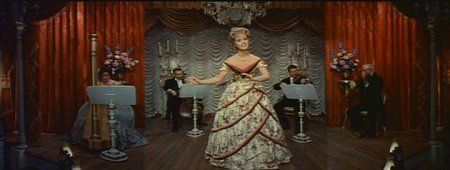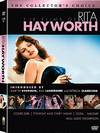





Debbie Reynolds
Biography | Filmography | Awards | Bibliography | Gallery | News | Downloads | Links | Image Credits | SINGIN' IN THE RAIN
| Page 5 |
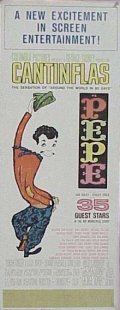 Finally free to chose her own scripts, Debbie signed on for Paramount's film adaptation of Garson Kanin's THE RAT RACE (1960), a comedy-drama in which she and Tony Curtis play theatre hopefuls (he -- a musician; she -- a dancer) who fall on hard times and decide to platonically share an apartment in New York. Free from MGM glitz, THE RAT RACE attempted to depart from Debbie's usual sweetness-and-light fare and furthered her string of box office successes. Also in 1960, Debbie joined over 30 other Hollywood stars making cameo appearances in PEPE, Columbia's lengthy star-studded showcase for Mexican comic Cantinflas. Nominated for seven Academy Awards, PEPE failed to win any statuettes, and American audiences proved unreceptive to Cantinflas' brand of humor. Her appearance in the film did not noticeably affect Debbie's career, either positively or negatively, however. |
|
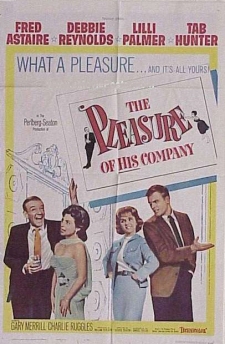 In 1961, Debbie joined Fred Astaire for the first time since her 1950 MGM debut THREE LITTLE WORDS, this time playing an engaged young woman whose long-absent father (Astaire) returns for her wedding and, advertently or not, begins to woo her away from her fiancé (Tab Hunter) while at the same time, trying to win back his wife (Lilli Palmer), much to the chagrin of her new husband (Gary Merrill). Though Debbie and Astaire do dance together briefly, THE PLEASURE OF HIS COMPANY (1961) is a non-musical comedy, and its critical reception was mixed, with many reviewers feeling Astaire had been miscast. Debbie's comic turn earned its usual plaudits however, and audiences turned out once more for this, another enjoyable piece of freewheeling film fluff. |
|
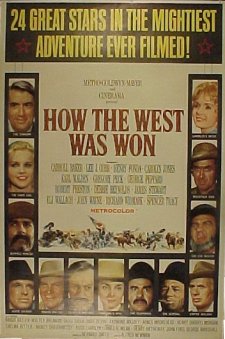 In another star-studded affair, Debbie played pioneer woman Lillith Prescott in MGM's epic western spectacle HOW THE WEST WAS WON (1962), co-starring Gregory Peck, Jimmy Stewart, Carroll Baker, Karl Malden, Agnes Moorehead, Henry Fonda, Robert Preston and Thelma Ritter. An attempt to trace the history of western expansion in the United States through a series of vignettes centered around four generations of the same family, HOW THE WEST WAS WON was the first full-length feature film shot in Cinerama, a widescreen process developed in the early 1950s which used three cameras filming side by side to create an especially wide image which, in the theatre, was projected onto a large curved screen by three adjoining projectors. Introduced to help movies compete with the new medium of television, Cinerama gave audiences a sense of being "surrounded" by the action on the screen, much as IMAX does today. |
|
|
Debbie singing "A Home in the Meadow" from HOW THE WEST WAS WON (1962). Note the prodigiously wide Cinerama aspect ratio illustrated in this screen capture, creating an image almost three times as wide as it is tall. Another element of the Cinerama experience was the format's seven-channel stereo audio track, which was given memorable material to render in Alfred Newman's melodic, Oscar-nominated score, one of the best ever written for a film western. Debbie's vocal contributions to the film's soundtrack -- which varied in form from the rousing hoe-down tune "Raise a Ruckus Tonight," to the saucy saloon song "What Was Your Name in the States?," to the pensively sad "A Home in the Meadow" -- also fared well in the seven-channel format and are among the less "spectacular" highlights of the picture. Music Clips from HOW THE WEST WAS WON (1962):
|
|
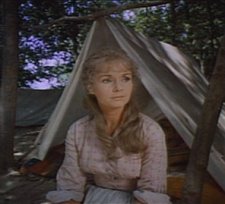 Debbie as a 17-year-old Lillith. |
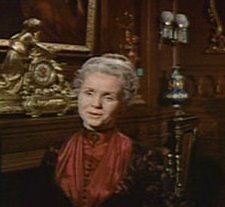 Debbie as Lillith in her eighties. |
Unfortunately, much of what made HOW THE WEST WAS WON such a
spectacular critical and commercial success in 1962 -- the
grandeur of its panoramic vistas, its larger-than-life stunts and
action sequences which seem almost to leap from the screen into
the theatre -- is lost in modern exhibition methods which either
crop the image (for television), shrink it (for letterboxed home
video presentations) or flatten it (for modern theatrical
screenings). For all its stars, HOW THE WEST WAS WON covers
too much history in the space of two hours and forty minutes to
give any individual characters much depth, and as a result, many
of the roles come off as glorified cameos. One of the few
exceptions to this trend however, is Debbie's character, Lillith
Prescott, the only character in the film to appear all the way
through the picture and the unifying link which ties the five
distinct narrative segments together. As usual, Debbie's
energy lifts the film at several key moments, and her sense of
humor (especially in her scenes with
Gregory Peck and
Robert Preston)
give life to the sometimes floundering script -- in the end,
making Debbie's contribution to the heart of the film (as opposed
to its spectacle) vital.Video Clip from HOW THE WEST WAS WON (1962):
(For help opening any of the multimedia files, visit the plug-ins page.) |
|
|
Go to the next
page. |
|
| Now in Print! |
|---|
| Now on DVD! |
|---|
Buy Videos & DVDs |
|
Buy Movie Posters |
|
Buy Movie Posters |
|
Classic
Movie Merchandise |
|
![]() Printer-friendly version.
Printer-friendly version.
![]() Return
to the top.
Return
to the top.
Last updated:
March 10, 2011.
Reel Classics is a registered trademark of Reel Classics, L.L.C.
© 1997-2011 Reel Classics, L.L.C. All rights reserved. No
copyright is claimed on non-original or licensed material.
Terms of
Use.




